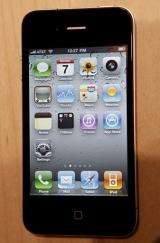New gov't rules allow unapproved iPhone apps (Update 3)

(AP) -- Owners of the iPhone will be able to legally unlock their devices so they can run software applications that haven't been approved by Apple Inc., according to new government rules announced Monday.
The decision to allow the practice commonly known as "jailbreaking" is one of a handful of new exemptions from a 1998 federal law that prohibits people from bypassing technical measures that companies put on their products to prevent unauthorized use of copyright-protected material. The Library of Congress, which oversees the Copyright Office, reviews and authorizes exemptions every three years to ensure that the law does not prevent certain non-infringing uses of copyright-protected works.
For iPhone jailbreakers, the new rules effectively legitimize a practice that has been operating in a legal gray area by exempting it from liability. Apple claims that jailbreaking is an unauthorized modification of its software.
Mario Ciabarra, founder of Rock Your Phone, which calls itself an "independent iPhone application store," said the rules mark the first step toward opening the iPhone app market to competition and removing the "handcuffs" that Apple imposes on developers that want to reach users of the wildly popular device.
Unless users unlock their handsets, they can only download apps from Apple's iTunes store. Software developers must get such apps pre-approved by Apple, which sometimes demands changes or rejects programs for what developers say are vague reasons.
• PhysOrg.com iPhone / iPad Apps
• PhysOrg.com Audio Podcasts / iTunes
• PhysOrg.com Android apps (new version available)
• Join PhysOrg.com on Facebook!
• Follow PhysOrg.com on Twitter!
Ciabarra noted that Google Inc. has taken a different approach with its Android operating system, which is emerging as the biggest competitor to the iPhone. Google allows users of Android phones to download applications from outside the Android Market.
Although Apple has never prosecuted anyone for jailbreaking, it does use software upgrades to disable jailbroken phones, and the new government rules won't put a stop to that. That means owners of such phones might not be able to take advantage of software improvements, and they still run the risk of voiding their warranty.
Apple spokesman Natalie Kerris said Monday that the company is concerned about jailbreaking because the practice can make an iPhone unstable and unreliable.
"Apple's goal has always been to ensure that our customers have a great experience with their iPhone, and we know that jailbreaking can severely degrade the experience," she said.
In addition to jailbreaking, other exemptions announced Monday would:
- allow owners of used cell phones to break access controls on their phones in order to switch wireless carriers.
- allow people to break technical protections on video games to investigate or correct security flaws.
- allow college professors, film students, documentary filmmakers and producers of noncommercial videos to break copy-protection measures on DVDs so they can embed clips for educational purposes, criticism or commentary.
- allow computer owners to bypass the need for external security devices called dongles if the dongle no longer works and cannot be replaced.
- allow blind people to break locks on electronic books so that they can use them with read-aloud software and similar aides.
Although the jailbreaking exemption is new, all the others are similar to the last set of exemptions, which were announced in November 2006. The new rules take effect Tuesday and are expected to last a few years.
The exceptions are a big victory for the Electronic Frontier Foundation, which had urged the Library of Congress to legalize several of them, including the two regarding cell phones.
Jennifer Stisa Granick, EFF's civil liberties director, said the rules are based on an important principle: Consumers should be allowed to use and modify the devices that they purchase the way they want. "If you bought it, you own it," she said.
©2010 The Associated Press. All rights reserved. This material may not be published, broadcast, rewritten or redistributed.
















